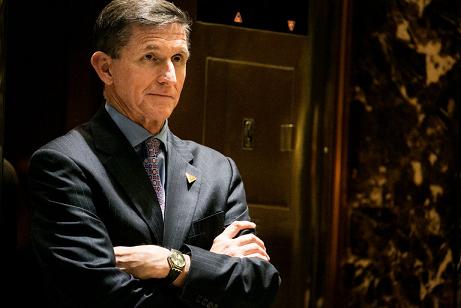by WorldTribune Staff, May 30, 2017
Mike Flynn has not been indicted, has not gone to trial and no one has presented any evidence of wrongdoing against the former national security adviser.
Jokes and innuendo. That’s all the various pundits, late night talk show hosts, former officials and assorted Trump-haters have, Eli Lake wrote in an opinion column for BloombergView on May 26.

“If there is evidence that he betrayed his country, it has yet to be presented.”
And, yet, they have already tried and convicted Flynn in their minds, in their columns and on their shows and websites, Lake contended. The same modus operandi is being deployed against other key Trump staffers.
“None of the many news stories about Flynn’s contacts with Russians and Turks has accused him of being disloyal to his country. And yet a decorated general has already been tried and convicted in the press.”
From “Morning Joe,” last week: “When it comes to legal issues, he’s like Charmin. You just keep squeezing.”
Then there was Stephen Colbert’s segment from February about Trump’s former national security adviser: “It’s funny ’cause it’s treason.”
In an exchange in the New Yorker last month with former acting attorney general Sally Yates, reporter Ryan Lizza asked Yates about how she informed the White House counsel that Flynn had lied to his colleagues about his monitored conversations with the Russian ambassador. “You didn’t just text, ‘Heads-up, your NSA might be a spy’?” Lizza asked. Yates quipped: “Is there an emoji for that?”
“It’s nice to see our elites are in such good humor about something so grave,” Lake wrote. “If there truly was treason, it’s no joking matter. If there was not, then this man’s name is being tarnished unfairly. Ha. Ha.”
None of this would be happening, Lake noted, “without some very dirty business from the national security state. It’s a two-pronged campaign. First there are the whispers. Anonymous officials describe in detail elements of an ongoing investigation: intercepts of conversations between Russian officials about how they could influence Flynn during the transition; monitored phone calls about how Flynn had lied about his conversations with the Russian ambassador to his colleagues; how Flynn failed to disclose his payment from the Russian propaganda network on his official forms. This prong of the campaign is at least factual, but the facts don’t speak for themselves.
“The second and more insidious element here is the innuendo. Yates never says Flynn was a spy for Russia. But her public remarks to Congress and the media appear designed to leave that impression. As she told Lizza, Flynn was ‘compromised by the Russians.’ This sounds far more sinister than Flynn’s explanation when he left his post in February. Back then he said he had forgotten elements of his discussion with the Russian ambassador that covered a wide range of issues.”
Still, Lake points out, Yates’s innuendo “is nothing compared to that dropped by former CIA director John Brennan,” who “treated the House Intelligence Committee to a feast of ominous suggestions.”
Brennan warned: “Frequently, people who go along a treasonous path do not know they are on a treasonous path until it is too late.” Contacts between the Trump campaign and Russian individuals “raised questions in my mind about whether Russia was able to gain the cooperation of those individuals.” This cooperation could be “witting” or “unwitting,” Brennan cautioned.
But Brennan “did not accuse anyone in Trump’s orbit of espionage or treason,” Lake wrote. “He didn’t say the Russian plan worked. He just said that when he left office he had questions. A definite ‘maybe.’ ”
In a normal situation, Lake wrote, “the government collects evidence before hinting to the public what it might be seeking evidence about. Think of FBI agent Robert Hanssen or CIA officer Aldrich Ames, both of whom provided the Soviet Union with information that led to the deaths of American agents. Ames and Hanssen are fiends. And yet the public learned about their treachery only when the government charged them.”
Lake continued: “The discretion of our spy hunters is important not just to protect the rights of the accused. It also is vital to the health of our own political culture. Public discussion of ongoing counterintelligence probes by necessity relies on state secrets. When anonymous allegations of political figures find their way into the press, the guardians of those secrets control the debate. What’s more, political debates that revolve around the loyalty of current or former high officials historically has degenerated into witch hunts.
“It’s too soon to say whether Mike Flynn is facing a witch hunt. There’s no evidence coming from current and former government officials, just jokes and innuendo. He has not been charged with anything. The specific legal violations he is alleged to have committed – such as failing to register as a foreign agent for a contract with a Turkish businessman – do not amount to betraying his country. And yet our elites have already convicted a decorated general of being a bumbling traitor. What if they’re wrong?”
Letters to the Editor __ Subscribe to Geostrategy-Direct __ Support Free Press Foundation
